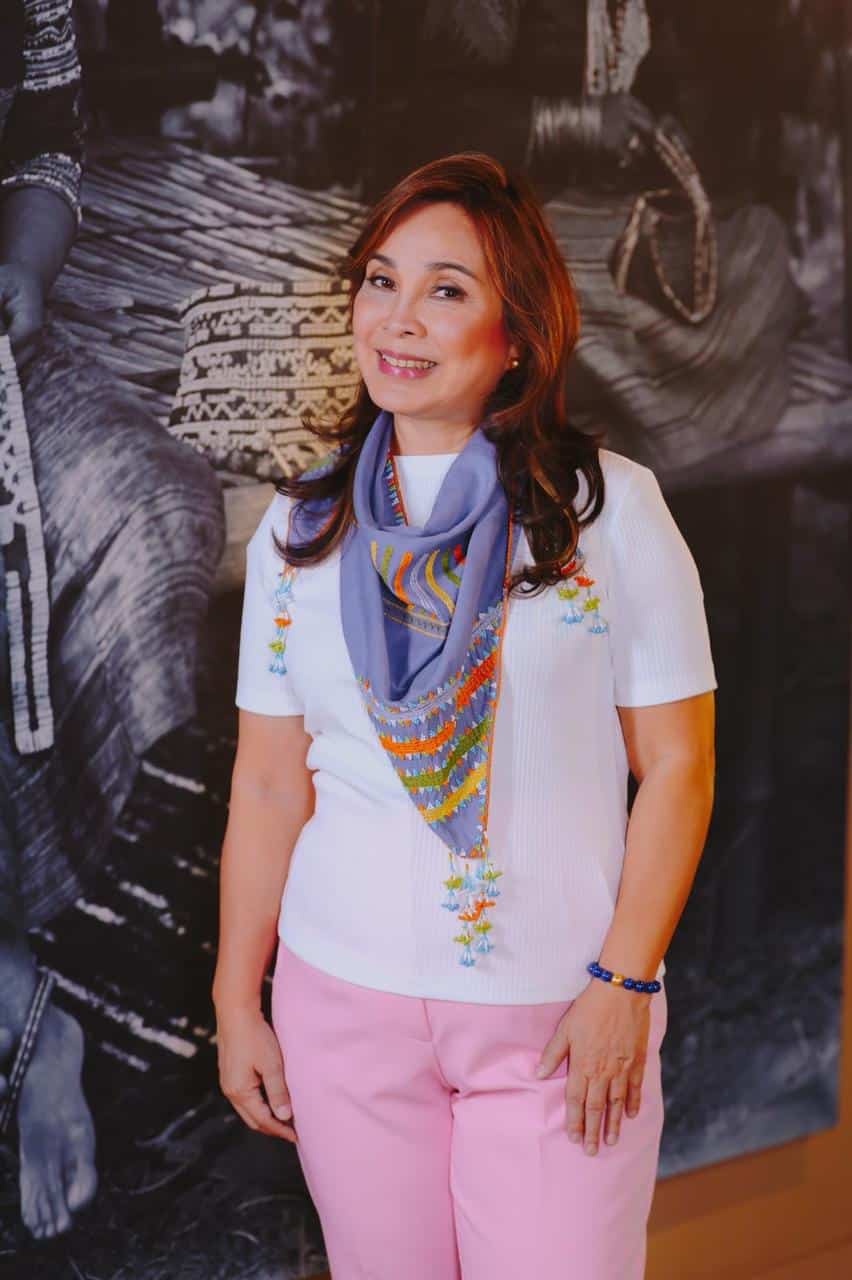
MANILA, Philippines – As the nation celebrates National Arts Month this February, Senator Loren Legarda, Dangal ng Haraya awardee (Patron of Arts and Culture), calls on all Filipinos to embrace, nurture, and honor the country’s artistic and cultural heritage that gives meaning and purpose to our identity as Filipinos.
For the four-term senator, culture and the arts are an integral part of nation-building, the pulse of the nation, and the living memory of the Filipino spirit.
Legarda believes that the richness of our traditions, arts, and culture is the language of the soul, expressing the rich history, resilience, aspirations, and dreams of our people.
“The arts and culture are the heartbeat of our nation, keeping alive the wisdom and artistry of our forebears while shaping the narratives that define us today. Through arts and culture, we share stories of our people, we empower communities, sustain livelihoods, and inspire generations to continue dreaming, creating, and building a future full of purpose and boundless possibilities” said Legarda, chairperson of the Senate Committee on ulture and the Arts.
Presidential Proclamation No. 683, issued by then President Corazon Aquino in 1991, declared February as National Arts Month to honor the invaluable contributions of Filipino artists and cultural workers.
Article continues after this advertisement
Continuing this legacy, Legarda, who has dedicated her life to ensuring that Filipino culture and arts thrive and progress, has tirelessly worked to integrate culture and arts to the national agenda.
Article continues after this advertisement
She has been instrumental in establishing the Senate Committee on Culture and the Arts as a stand alone committee, recognizing that culture and the arts are not mere adjuncts to other sectors but fundamental forces in shaping national identity, fostering social cohesion, and driving sustainable development.
“Culture is not just a segment of governance; it is the foundation of our identity, our shared history, and our aspirations as a people. It must be safeguarded, enriched, and passed on,” she emphasized.
Legarda has consistently championed landmark legislation that safeguard cultural heritage and support creative industries, including the Cultural Mapping Law (Republic Act (RA) No. 11961), which mandates local government units to conduct comprehensive cultural mapping of both tangible and intangible heritage; the National Cultural Heritage Act (RA No. 10066), which strengthens the protection and conservation of cultural heritage; National Museum of the Philippines Act (RA No. 11333), which strengthens the museum’s collections, redevelops its facilities; Gabaldon School Buildings Conservation Act (RA No. 11194), which ensures the preservation of historic Gabaldon school buildings; and Philippine Tropical Fabrics Law (RA No. 9242), which promotes the use of indigenous fabrics in government uniforms to support local weavers and the fiber industry, to name a few.
Beyond legislation, Legarda has been a driving force in promoting Philippine arts and culture through numerous initiatives and projects.
She has supported the country’s national artists, such as Virgilio Almario, Ramon Santos and Alice Reyes.
She has produced cultural television programs such as Dayaw, a documentary series on indigenous culture and traditions; Maaram, a multimedia project documenting intangible cultural heritage; Usapang Wika, a documentary highlighting the diversity of Philippine languages; and Buhay na Buhay, which explores the eight living cultural traditions in the Philippines.
“Culture must be understood, felt, and lived. By experiencing, seeing, and truly understanding it, we can ensure that our people, especially the youth, develop a deep connection to it,” she said.
The UPLB Sculpture Garden is the first of its kind in the country and was conceptualized by Legarda.
The Sculpture Garden serves as a venue of Junyee’s award-winning works will be put on permanent exhibition including the first indoor installation exhibition in the history of art, “Wood Things,” made in 1980.
Junyee is the pioneer of installation art in the country.
“Engaging with our cultural roots, we do not just preserve the memory of our past, we continue to breathe life into it, ensuring it is appreciated, and remembered, allowing its significance to grow and inspire generations,” Legarda added.
Legarda also emphasized the need to strengthen cultural industries by supporting sustainable livelihoods and ensuring the transmission of knowledge from one generation to the next.
“The challenge today is to protect our arts, culture, and traditions from the threats of modernization and mass production. We must invest on human capital, our local artisans, provide them with platforms to flourish and thrive, ” Legarda said.
Building on this advocacy, Legarda consistently championed initiatives that uplift cultural industries.
She has been supporting the annual National Arts and Crafts Fair where small businesses, community-based livelihoods, and indigenous peoples, are given economic opportunities while showcasing their locally made products.
Her support to the Philippine textile industry is evident in her work with the Philippine Fiber Development Authority (PHILFIDA), establishing weaving centers and cotton processing facilities nationwide, and the Philippine Textile Research Institute (PTRI), establishing natural dye centers in remote barangays thus ensuring that traditional weaving remains a thriving livelihood and not just a fading memory of the past.
Notable are her efforts to revive the patadyong industry, which to date has continued to flourish.
Understanding that culture is best preserved when passed down from one generation to the next, Legarda has also supported the establishment of Schools for Living Traditions (SLTs), which serve as vital spaces for the intergenerational transmission of indigenous knowledge, skills, and crafts.
Building on this commitment, Legarda is actively advocating for the passage of the Linangan ng Likhang Bayan bill, a measure aimed at institutionalizing support for cultural masters and artisans.
Firmly believing in the power of arts and culture to shape international relations, Legarda highlights its role in fostering diplomatic ties and national pride.
“Culture and the arts are powerful tools for soft power, a means to build bridges across nations, foster mutual understanding, and advance our diplomatic interests. It is through the arts that we converse with the world, sharing the profundity of our narratives, and the boundless ingenuity of our people. It is through cultural diplomacy that we assert our presence in the global community, shape the global perception of our nation, and forge connections that inspire unity, understanding and respect,” Legarda asserted











